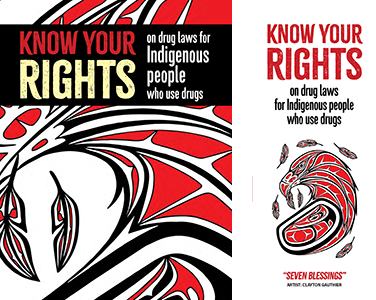Overview
Imprisonment. Lack of culturally appropriate access to health services and resulting poor health. Poverty.
Each of these factors increases a person’s risk of contracting HIV — and in Canada, Indigenous people suffer disproportionately from all of them
We’ve collaborated with Indigenous organizations across the country since 2001 to respond to HIV on two fronts:
- in marginalized populations in which Indigenous people are overrepresented, such as prisoners and drug users, and
- in Indigenous communities, where discrimination, inadequate funding and inconsistent quality of HIV programs and services all remain problematic.
Learn more:
HIV Legal Network Submission (January 2025) – Safer Municipalities Act, 2024 — Restricting Public Consumption of Illegal Substances Act, 2024
The HIV Legal Network urges the Ontario government to withdraw the Safer Municipalities Act, which will do nothing to address the crisis of homelessness and drug toxicity deaths in the province, and only further harm people who use drugs, particularly those who are unhoused.
Rapid Q&A on the “Community Care and Recovery Act, 2024”
On November 18, 2024, the Ontario government tabled Bill 223, Safer Streets, Stronger Communities Act, 2024. While the bill amends several laws, of relevance to drug policy is Schedule 4 of the legislation, titled Community Care and Recovery Act, 2024. This Q&A explains what is entailed in this Act.
Raising the Bar – 2023/2024 Annual Report
The creation of our annual report always gives us a unique opportunity to look back at a year’s worth of important work with hindsight, clarity, and pride. As you will see in Raising the Bar — our 2023/24 annual report — our successes and challenges don’t begin and end with the flip of a calendar … Read more
Know Your Rights: on drug laws for Indigenous people who use drugs
Drug policy in Canada is rooted in racism and colonialism, and Indigenous communities have experienced long histories of drug policy harms. Among Indigenous people living with HIV, transmissions are attributable to injection drug use at a much higher rate than for non-Indigenous populations, while Indigenous peoples have also suffered a disproportionate proportion of fatal overdoses … Read more
HIV, Hepatitis C and Sexually Transmitted and Blood-Borne Infections in Canada: Top Election 2021 Issues
Joint press release: HIV, Hepatitis C and Sexually Transmitted and Blood-Borne Infections in Canada: Top Election 2021 Issues Health and human rights groups identify priorities for federal policymakers as people in Canada head to the polls Tuesday, September 14, 2021 – More than 60,000 people are currently living with HIV in Canada, approximately 13% of … Read more



